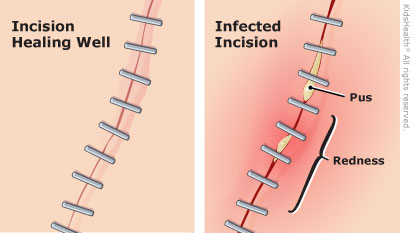Heart transplantation gave your child a healthy, working heart. You'll need to be extra careful over the next few months. Your health care provider prescribed medicine to keep your child's body from rejecting (not accepting) the new heart. A side effect of the medicine is that your child is more likely to get infections. Sometimes, the area around the surgical site also can become infected.


About Medicines
Preventing Infections
Staying Healthy

Your child:

Your child:

What should we know about rejection of the heart? Rejection happens because the body doesn't recognize the new heart and doesn't know that it is helpful. The body's immune system tries to attack it. The risk of rejection is highest in the first few weeks after transplant surgery. But the body never completely accepts the new heart. This means that anti-rejection medicine is taken for life.
Usually, the amount of anti-rejection medicine taken is reduced as the body gets used to the new heart. Rarely, the body refuses to accept the new organ and another transplant is needed.
What should we do when our family travels? When your family travels: